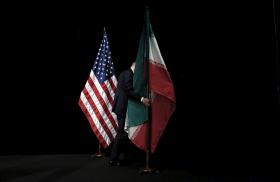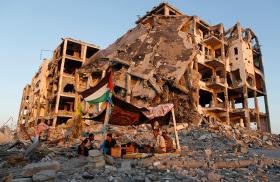
- Policy Analysis
- Articles & Op-Eds
The Most Important Nobel Winner You've Never Heard Of

The Nobel Committee rightfully recognized the strong civil society institutions that mediated Tunisia's difficult political transition at a time when other regional states were falling into chaos.
There's nothing flashy about this year's Nobel Peace Prize recipient. Outside Tunisia and the small community of Tunisia watchers, most people had likely never heard of the Tunisian National Dialogue Quartet before the announcement. The group seems unglamorous compared to Pope Francis, Edward Snowden, Angela Merkel and others who were evidently up for consideration. And that makes it a superb selection.
In the summer of 2013, two years into its democratic transition, Tunisia was reeling from a series of high-profile political assassinations, jihadist attacks on military installations and nearly a month of mass protests calling for the resignation of the post-uprising government. Tunisian society had become more and more polarized -- a development I witnessed firsthand in 2012 while living there as a graduate student -- with public officials spouting increasingly hyperbolic rhetoric and citizens reporting diminishing trust in the transition. To prevent the collapse of the country's budding and still fragile democracy, the Tunisian League of Human Rights, the Tunisian General Labor Union, the Tunisian Confederation of Industry, Trade and Handicrafts and the Tunisian Order of Lawyers (akin to a Bar Association) came together and formed a "Quartet" to mediate a compromise between the political parties.
As the Nobel Committee was careful to point out, this year's prize did not go to the individual organizations of the Quartet but to the quartet as a whole. There is a poignant message in Oslo's decision to award such a prestigious prize to a group of organizations made up of thousands of individuals, rather than to a single person or even to a single organization.
The academic literature has long stressed a high correlation between the strength of a country's democracy and the robustness of its civil society. The four organizations comprising the Quartet occupied that sacred space between the state and the family and that likely lent it the credibility needed to lead a national dialogue. One wonders if the Arab states that enjoyed their brief "spring" -- but later succumbed to seemingly irreconcilable political differences -- might have followed in Tunisia's footsteps had their civil societies been strong enough to support organizations capable of stepping in to mediate. In Tunisia, anyway, an academic theory became an empirical reality, and democracy scholars will likely be studying the Quartet's role in Tunisia's transition for years to come.
Though the award is shared equally amongst these groups, it is still worth spotlighting each member organization. These are, after all, the types of groups that less free countries need to build if they hope to make the transition from authoritarianism to democracy.
The Tunisian League of Human Rights, the oldest human rights organization in the Arab world (Tunisia boasts a long history of regional firsts), was founded in the mid-1970s by a group of liberals who had broken away from the increasingly autocratic ruling party of then-President Habib Bourguiba. After the state reluctantly granted the league formal recognition in 1977, its lawyers, professors, doctors and journalists spent decades investigating the regime's human rights violations. It also conducted and publicized studies on issues ranging from torture to freedom of speech to constitutional matters. And it advocated on behalf of the government's victims -- including some of the Islamists imprisoned under Bourguiba's successor, Zine el Abidine Ben Ali, who would lose his grip on power during the unrest of 2011.
To expand labor rights, the league's activists often worked hand in hand with members of the Tunisian General Labor Union (widely known by its French acronym UGTT). The oldest of the four Quartet members, the UGTT was founded in 1946 by many of the same individuals who went on to secure independence from the French a decade later. The organization's involvement in the struggle for independence lent it an enormous legitimacy, and throughout the Bourguiba and Ben Ali eras it remained the only independent broad-based movement capable of mobilizing masses -- a fact that occasionally brought it into conflict (sometimes deadly) with the regime. Suffice it to say the UGTT has always been more than a simple labor union, and today it boasts some 800,000 mostly public-sector members, a sizable percentage of the population in a country with a little under 11 million citizens.
The third Quartet member was the nation's premier private-sector union, the Tunisian Confederation of Industry, Trade and Handicrafts (which is also known by its French acronym, UTICA). Founded in 1947, the UTICA represents nearly 150,000 businesses in the nonagricultural sectors (excluding tourism and banking). The organization represents the business community in negotiations with the government and has been working to develop partnerships with foreign companies, all with the aim of improving the investment climate in Tunisia as the country struggles to revive its economy.
Rounding out the Quartet was the Tunisian Order of Lawyers, an independent organization representing and advocating on behalf of the country's lawyers since the 1970s. Lawyers, perhaps not surprisingly, were prime targets of repression under the Bourguiba and Ben Ali periods, and since the 2011 uprising the Order (to which all lawyers belong) has been a central player in efforts to establish an independent judiciary and implement legal protections for the thousands of Tunisians taking up the legal profession.
These, then, were the organizations that came together in 2013 to seek a way out of the political impasse. The aim of the National Dialogue, as the talks arranged by the Quartet came to be known, was to pressure the parliament's Islamist and non-Islamist factions into hashing out a compromise that would break the gridlock and get the political process back on track. Glamorous work this was not. For nearly three months, the Quartet oversaw what was by most accounts a messy, exhausting and frustrating process. On more than one occasion, the talks broke down. But as a result of the Quartet's mediation efforts, the government that had come to power following the uprising, which was dominated by the Islamist Ennahda Party, agreed to step down and cede control to a caretaker government. In turn, a new constitution -- the most progressive in the Arab world -- was approved, direct elections were scheduled, and the country managed to avoid chaos.
The commentary on Tunisia following the National Dialogue tended to attribute the success of the talks to the dominant political participants rather than the dialogue's conveners. It was said, not unreasonably, that Ennahda and its co-founder Rached Ghannouchi displayed magnanimity in ultimately accepting many of the opposition's demands and allowing an unelected, technocratic government to take the reins in early 2014. Secularists like Beji Caid Essebsi, then leader of the Nidaa Tounes party and now the country's president, were applauded for dropping their insistence on dissolving the parliament and yielding to the Islamists' preference for a more robust legislature. In recent months, there were even rumors that the Nobel might go to Ghannouchi and Essebsi jointly, in recognition of their apparent, if grudging, willingness to work together.
I'm glad the Nobel Committee chose otherwise. Arguably the real leaders in that decisive moment were not the politicians, though their concessions should not be minimized. The most important political actors were the vigilant citizens of Tunisia's civil society, often with names unknown beyond their neighborhoods. When I was living in Tunis in 2012, I saw these citizens attending countless workshops -- organized by this or that civil society organization -- and debating the latest constitutional drafts up for consideration in parliament. Two years later, I saw them fanning out around the country to staff the polling stations and ensure a smooth, free and fair parliamentary election. It is only appropriate that Oslo recognized the organizations through which the people of Tunisia exercised this power.
The Nobel Committee's decision will give Tunisians a much-needed psychological boost as they continue to slog through the next phases of their transition and tackle serious economic and security challenges. The prize has already prompted renewed statements of support from the country's Western allies. As it should. Tunisia stands in contrast to the terrible trends taking hold across the region: witness the carnage in Assad's Syria, the expanding terror of the so-called Islamic State, regression in Egypt, chaos in Libya, a proxy war in Yemen, and an ossified regime in Algeria, to cite just a few examples. It is the only Arab Spring country to remain on a recognizable, if bumpy, path to democracy (though Morocco, it should be said, has embarked on gradual reform process.) In my travels across North Africa and my conversations with observers of the Arab world on this side of the Atlantic, Tunisia is often praised and then dismissed as "too small" to matter much for the rest of the region, let alone the world. Perhaps. But this small country is implementing some pretty big ideas.
One of those ideas takes aim at the dangerous zero-sum, winner-take-all approach to politics that has evidently become the governing method of choice across much of the Middle East -- to say nothing of the United States Congress, where toxic partisanship has made "compromise" a four-letter word. (The irony of a dysfunctional Congress holding up a request for greater assistance to a struggling democracy like Tunisia should be lost on no one.) The achievements of this year's Nobel Peace Prize winners are a testament to the often thankless, always messy and rarely glamorous work that must go into building and maintaining a healthy democracy.
Sarah Feuer is a Soref Fellow at The Washington Institute and was an election observer during Tunisia's 2014 parliamentary vote.
Politico



